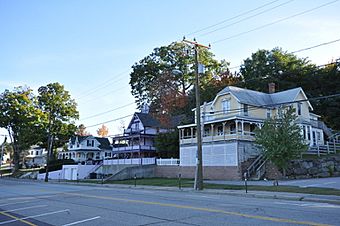New Hampshire Veterans' Association Historic District facts for kids
Quick facts for kids |
|
|
New Hampshire Veterans' Association Historic District
|
|

Buildings on Lakeside Avenue
|
|
| Location | Weirs Beach, Laconia, New Hampshire |
|---|---|
| Area | 7.7 acres (3.1 ha) |
| Built | 1875 |
| Architect | Multiple |
| Architectural style | Queen Anne |
| NRHP reference No. | 80000267 |
| Added to NRHP | May 22, 1980 |
The New Hampshire Veterans' Association Historic District is a special place in Weirs Beach, Laconia, New Hampshire. It's like a time capsule of old summer homes from the late 1800s. This area, about 8 acres big, was created by the New Hampshire Veterans' Association.
This group started to help veterans of the American Civil War get together for summer reunions. Over time, the association welcomed veterans from all of America's wars. The buildings here are unique because they were built to house many soldiers at once, sometimes even entire regiments! The district has 18 buildings. Five of them are on Lakeside Avenue, offering great views of Lake Winnipesaukee. Most of the others are on Veterans Avenue, just behind Lakeside Avenue. This historic district was added to the National Register of Historic Places in 1980.
What is the New Hampshire Veterans' Association?
The New Hampshire Veterans' Association was formed in 1875. They began holding their summer reunions at Weirs Beach the very next year. At first, the land belonged to a railroad company. But in 1924, the veterans' association bought the land themselves.
How the Buildings Were Built
From the mid-1880s to the 1890s, different groups of soldiers, called regiments, built their own homes here. Most of these buildings were made in the Queen Anne style. This style was popular back then and often features fancy towers, turrets, and decorative details. These homes were used to house the veterans during their reunions and help them with their activities.
Why is this Area Important to History?
The land where the veterans' association is located also has a very long history. It was once part of a Native American village called Aquadoctan. This was one of the largest Native American settlements in New Hampshire. People have lived here for a very long time, even before recorded history. Areas next to this property are also recognized for their important archaeological finds.
 | Madam C. J. Walker |
 | Janet Emerson Bashen |
 | Annie Turnbo Malone |
 | Maggie L. Walker |



